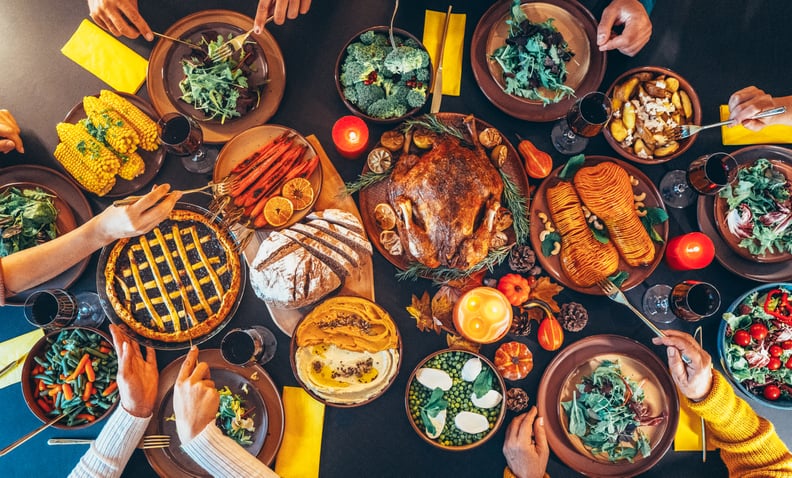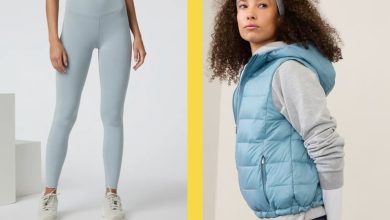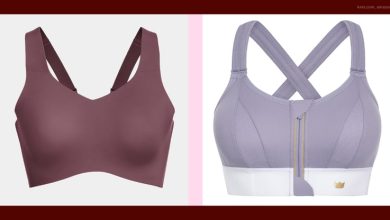How to Debloat After Overeating, According to Experts

During the holidays, it’s easy to go a little overboard. Be it Thanksgiving dinner or a festive feast, when you’re enjoying a delicious meal, eating too much isn’t exactly top of mind. Should you accidentally overeat, however, you know the rest of the evening is typically spent bloated and uncomfortable. The good news is, there are some ways to debloat quickly and ease the rest of your symptoms. Here’s what to do after overeating, according to experts.
First and foremost, Dalina Soto, MA, RD, LDN, wants you to know that bloating after eating is completely normal. “It’s normal to eat past the point of fullness when enjoying food,” she says. Bloating can also happen after overeating, or eating to the point of feeling uncomfortable. That said, you should never skip meals in “preparation” for a feast you plan on having, she says. This can make you even more likely to overeat since you restricted yourself prior.
On the other hand, frequent painful bloating after meals could be indicative of a larger health problem. For example, extreme bloating can be a sign of irritable bowel syndrome (IBS), especially after eating “trigger foods” (aka those high in FODMAPs), says Tessa Nguyen, RD, LDN. The debloating tips that follow are for people who do not have bigger issues related to bloating, such as IBS. If you’ve been diagnosed with IBS (or think you might have it), make sure to speak to a healthcare professional for more specific medical advice.
With this in mind, if you do end up bloated after a big meal, these expert-approved tips will help you feel better faster. Nguyen just wants you to remember that special occasions, and the food that comes with them, are meant to be enjoyed, period. While you can do your best to listen to your fullness cues, if you do overeat, don’t stress. We’re here to help.
Experts Featured in This Article:
Dalina Soto, MA, RD, LDN, is a registered dietitian and positive health advocate.
Tessa Nguyen, RD, LDN, is an internationally acclaimed chef, registered dietitian, and educator.
What to Do After Overeating
There’s a few different strategies to help you feel more comfortable after overeating (or just enjoying a really big meal). Here are a few helpful suggestions, as informed by registered dietitians.
- Drink more water: Drinking water may feel counterintuitive when you’re full, but it’ll keep your digestive system moving and help prevent constipation. “The amount of water each person needs varies, but a good rule of thumb is to check your urine,” Nguyen says. “If it’s clear to light yellow, you’re hydrated. If it’s darker, you may want to drink more water or liquids.” Plus, if your meal was salty, staying well hydrated helps flush the sodium out of your system. Skip the after-dinner alcoholic beverage and opt for H2O instead.
- Take a gentle walk: Staying on your feet is excellent for promoting digestion. That means one of the simplest ways to ease stomach discomfort after overeating is going for a walk. Nguyen says she favors gentle post-meal walks for digestion . . . emphasis on gentle. “Rigorous exercise right after a meal might cause you to become more uncomfortable and even sick,” she says.
- Stretch it out: We’re not saying you need to hit a vinyasa flow mid-dinner, but once you get home, Nguyen and Soto agree that some light yoga can help your GI tract and ease discomfort. Pick your flow and remember to take it slow.
- Sip some tea: Hot tea is a great choice after a big meal. For starters, drinking tea boosts your water intake, which may reduce bloating symptoms. But according to GoodRx, herbal teas also relax the muscles in the digestive tract, alleviating gas pain and other GI issues. Other teas (like ginger and chamomile) are great for nausea as well, which may be ideal if you accidentally overate.
Next-Day Tips After Overeating
The tips don’t stop the day of the big meal. Here’s a few things you can do the day after overeating to alleviate symptoms.
- Fill up on fiber: This is more of a next-day tip, but since fiber is great for digestion, when you wake up the next morning, try starting with a fiber-rich breakfast. This might include a warm bowl of oatmeal or a filling chia pudding.
- Eat nutrient-dense meals: Make an effort to keep your meals as well-balanced and nutrient-dense as possible, especially the day after feeling bloated. In particular, load up on fruits and vegetables for better digestion.
- Work up a sweat: Getting your heart rate up may help you beat the lethargy that comes with bloating. You don’t even need to leave your home. Just remember: you should not do heavy exercise right after a big meal. Plus, Nguyen says that, “Using exercise as a ‘punishment’ for eating, holidays or not, is never healthy.”
- Skip hard-to-digest foods: Even though it’s encouraged to eat fiber-filled and well-balanced meals the day after you overeat, it’s also important to give your stomach a break. This might mean skipping beans and cruciferous vegetables (like broccoli and kale). Although they’re high in fiber, they can be difficult to digest and increase bloating. If you must, try eating these veggies cooked rather than raw so your body has an easier time breaking them down.
- Change your mindset: Ultimately, the worst thing you can do is beat yourself up about overeating. “Dieting culture has hammered into our brains that food is for survival, not for pleasure,” Nguyen says. Bloating after a big meal is, as previously mentioned, completely normal, and it’s OK to want to debloat afterwards. But also, try to let go of any harbored shame or negativity you may be harboring. Consider some of the tips mentioned here, and focus on doing activities that you enjoy. If all else fails, time will do the trick.
— Additional reporting by Chandler Plante
Samantha Brodsky is a former assistant editor at PS. She uses her gymnast background to inform her sports and fitness coverage, powering through Peloton videos in her free time.
Chandler Plante (she/her) is an assistant health and fitness editor for PS. She has over four years of professional journalism experience, previously working as an editorial assistant for People magazine and contributing to Ladygunn, Millie, and Bustle Digital Group.



